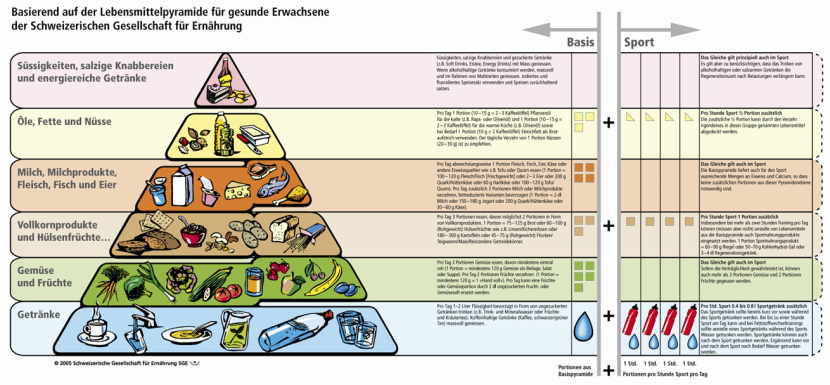Food pyramid
The Swiss Society for Nutrition (SGE) provides the basis for a healthy diet (in sport) with its food pyramid. The pyramid shows that food components in the lower levels can be consumed in large quantities for a healthy diet. The further the pyramid runs towards the top, the fewer of the listed food components should be consumed. Portions are calculated according to body weight. Basically, it is important to ensure a balanced diet, i.e. a wide variety of foods, taking the pyramid into account.
The basic pyramid has been supplemented by the SBU with further recommendations for sportspeople. This advice is aimed at people who do at least one hour of moderate-intensity sport most days of the week (i.e. from approx. 5 hours of sport per week). If the recommendations of the basic pyramid for athletes are adhered to, this is sufficient for the intake of essential nutrients and protective substances and to cover energy requirements. The additional requirement for higher intensity must be covered accordingly. Athletes should adhere to the recommendations of the food pyramid on a daily basis to maintain their performance.
Drink 1-2 litres of liquid per day, preferably in the form of unsweetened drinks (e.g. (mineral) water or fruit and herbal tea).
Athletes: Drink an additional 0.4-0.8 litres of a sports drink per hour of exercise and supplement with water if necessary.
Eat 3 portions of vegetables a day, at least one of which should be raw. Eat 2 portions of fruit per day. One portion of fruit or vegetables per day can be replaced by 2 litres of unsweetened fruit or vegetable juice.
Athletes: Additional portions can also be eaten if tolerated.
Eat 3 portions a day, 2 of which should be wholemeal products.
Athletes: add one portion per hour of sport.
Eat 1 portion of meat, fish, eggs, cheese or other protein sources such as tofu or Quorn alternately per day. Consume an additional 3 portions of milk or dairy products per day, favouring low-fat varieties.
Athletes: No additional portions are necessary, as sufficient amounts of protein and calcium are available.
A portion of vegetable oil (2-3 teaspoons) per day for hot and cold cooking. If required, 1 portion (2 teaspoons) of spreadable fat. 1 portion (20-30g) of nuts is recommended.
Athletes: Take an additional ½ portion per hour of sport.
Enjoy with moderation. If alcoholic drinks are consumed, enjoy them in moderation and as part of a meal. Add salt to food with restraint.
Athletes: The same principle of the basic pyramid applies, although alcohol or low-salt drinks can extend the recovery time.

More info: